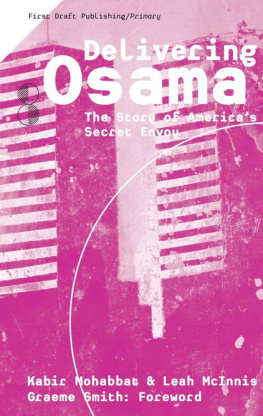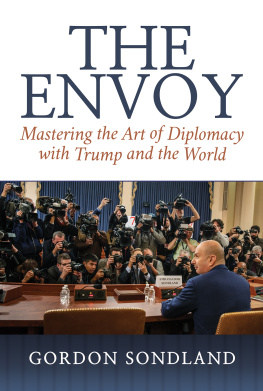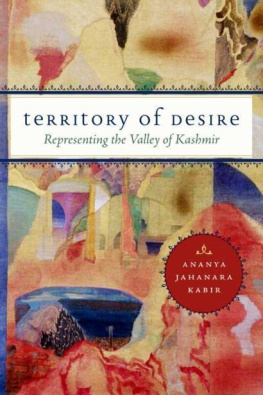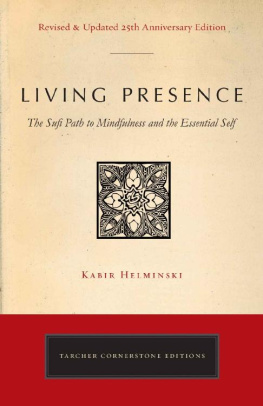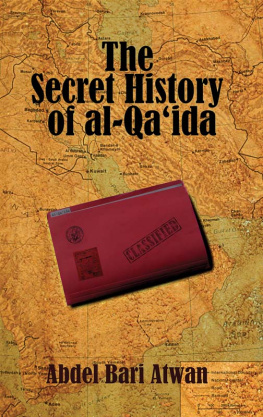Kabir Mohabbat - Delivering Osama: The Story of Americas Secret Envoy
Here you can read online Kabir Mohabbat - Delivering Osama: The Story of Americas Secret Envoy full text of the book (entire story) in english for free. Download pdf and epub, get meaning, cover and reviews about this ebook. year: 2020, publisher: First Draft Publishing, genre: Politics. Description of the work, (preface) as well as reviews are available. Best literature library LitArk.com created for fans of good reading and offers a wide selection of genres:
Romance novel
Science fiction
Adventure
Detective
Science
History
Home and family
Prose
Art
Politics
Computer
Non-fiction
Religion
Business
Children
Humor
Choose a favorite category and find really read worthwhile books. Enjoy immersion in the world of imagination, feel the emotions of the characters or learn something new for yourself, make an fascinating discovery.
- Book:Delivering Osama: The Story of Americas Secret Envoy
- Author:
- Publisher:First Draft Publishing
- Genre:
- Year:2020
- Rating:4 / 5
- Favourites:Add to favourites
- Your mark:
- 80
- 1
- 2
- 3
- 4
- 5
Delivering Osama: The Story of Americas Secret Envoy: summary, description and annotation
We offer to read an annotation, description, summary or preface (depends on what the author of the book "Delivering Osama: The Story of Americas Secret Envoy" wrote himself). If you haven't found the necessary information about the book — write in the comments, we will try to find it.
Delivering Osama: The Story of Americas Secret Envoy — read online for free the complete book (whole text) full work
Below is the text of the book, divided by pages. System saving the place of the last page read, allows you to conveniently read the book "Delivering Osama: The Story of Americas Secret Envoy" online for free, without having to search again every time where you left off. Put a bookmark, and you can go to the page where you finished reading at any time.
Font size:
Interval:
Bookmark:
Kabir Mohabbat and Leah McInnis: Delivering Osama:
The Story of Americas Secret Envoy
First Draft Publishing/ Primary
Kabir Mohabbat and Leah McInnis: Delivering Osama: The Story of Americas Secret Envoy
Graeme Smith: Foreword

First published in English in Germany in 2020
by First Draft Publishing GmbH,
M. Kabir Mohabbat and L. McInnis 2004, 2011, 2020
Foreword: Graeme Smith 2019
ISBN 978-3-944214-31-3 (softcover)
ISBN 978-3-944214-30-6 (kindle)
ISBN 978-3-944214-29-0 (epub)
Cover Photography: Philip Poupin
www.philippoupin.fr
Typefaces: Heimat Mono www.atlasfonts.com & Arnhem www.ourtype.be
All rights reserved. Alle Rechte vorbehalten.
First Draft Publishing GmbH, Berlin
www.firstdraft-publishing.com
To:
Kabirs Family
&
Mrs. Phyllis Oakley
& Don Woodward
And To:
Garland Deen Mack McInnis, Jr.
Once you crush the head of a snake, the rest will die by itself.
William Milam
United States Ambassador to Pakistan
Table of Contents
Graeme Smith:
Foreword
American leaders started the war in Afghanistan with loud declarations that they would get Osama bin Laden and smash the Taliban regime that sheltered him. U.S. officials have been quieter about their covert negotiations with the Taliban before and after September 11, 2001, for help with killing or capturing the Al-Qaeda leader. With a sanguine perspective years later, any reasonable observer could see that negotiating for bin Ladenif successfulwould have been less destructive than kicking off the longest war in American history, a conflict that today ranks as the deadliest war in the world. Nobody in the United States was feeling cool-headed at the time, however, and few had the stomach for bargaining with the simple mullahs who headed a pariah regime in one of the worlds poorest countries. The ruins of New York towers were still smouldering when the U.S. halted negotiations and invaded.
Guessing the alternative paths of history is a fraught exercise, and its impossible to prove that different choices would have had better results. If the Americans had cut a deal with the Taliban to get rid of the Al-Qaeda leader before 9/11, could they have averted the tragedy? If they reached agreement in the tense aftermath, could they have prevented thousands of subsequent tragedies in Afghanistan? There are no academically rigorous answers to such questions, but that does not ease the gnawing doubts.
Most of the players involved in the war have their own questions like this, about missed opportunities for steering away from disaster. Retired American generals will say that overwhelming numbers of U.S. troops should have been deployed earlier, or should not have been distracted by a parallel mission in Iraq. Retired American diplomats will say the post-invasion political order should have included the Taliban and other conservative Islamist factions, as a way of bolstering the legitimacy of the new authorities in Kabul. Such prominent commentators usually indicate regret about how the war was conducted, rather than rethinking why U.S. forces were necessary in the first place.
Perhaps fundamental questions about the origins of the war deserve greater attention. America invaded Afghanistan back in the days when the U.S. enjoyed a short-lived position as the sole dominant power in the world, flush with wealth after a long stretch of economic growth, easily capable of persuading allies to contribute tens of thousands of soldiers and billions of dollars to its campaigns. The idea of attacking a landlocked country on the other side of the planet, dismissing the government, and setting up a democracy modelled after Western systems seemed like a reasonable project. But the world has changed, even as the Afghan war grinds on, and its now hard to imagine European governments showing the same enthusiasm for another U.S. adventure. China and Russian might not show as much patience next time the United States wants to set up large military bases on their doorsteps. American taxpayers who drive over potholes on their daily commutes are feeling more resistant to the idea of sending money to faraway lands to pay for roads, bridges, and other fundamentals of state-building.
Voices from the left and right of the political spectrum in Western countries are increasingly skeptical of endless wars. As U.S. power fades, there is growing demand for subtler solutionsnot about how to win a war like the Afghan conflict, but how to avoid such a morass. Even if academics are loathe to play the parlour game of alternative histories, in other words, Western officials and policy experts will be taking a hard look at their governments bruising experiences in Afghanistan and asking how things could have turned out differently.
Any serious effort to examine the failed diplomacy leading to war will require reading this quirky little memoir from Kabir Mohabbat. His text has been circulating for years as a kind of samizdat among veteran observers of Afghanistan, and his wild story has gained credibility among some of them. In these pages Mohabbat emerges as a gung-ho Texan businessman from a prominent Afghan family who is bad at writing, awful at turning a profit, and unreliable as a narratorbut indispensable as a witness to history.
Mohabbat dumps years of meeting notes, hotel receipts, and other evidence into the historical debates about whether there was a viable option of negotiating for bin Laden. In his telling, he served as an unofficial liaison between the Taliban and U.S. governments, trying to resolve the problem of bin Ladens presence in Afghanistan. Mohabbat says he wanted to improve bilateral relations between the two countries as a way of smoothing a path toward development of Afghan oil resources and making himself rich. His central argument is that the Taliban tried to give up the Al-Qaeda leader but the U.S. waffled and missed the chance to stop 9/11. After the attacks, he claims, the Americans failed to make a serious effort toward diplomacy.
It is unclear whether the protagonists of the Afghan drama took Mohabbat seriously. The official account in The 9/11 Commission Report makes only cursory references to his dialogue efforts. Still, Mohabbat appears to have enjoyed significant access to the Taliban at critical moments. On the morning after 9/11, he received a call from Mullah Akhtar Osmani, a senior Taliban figure, who put the phone on speaker mode so he could speak with the regimes leadership. The Taliban were dumbfounded by the attacks and skeptical that their Arab guests could have pulled it off. They asked the Texan businessman to switch on CNN in his hotel room and translate into Pashto, because the mullahs shunned television and did not have access to international news. The Taliban were stunned that man-made objects such as the Twin Towers could have existed. The scale of the towers defied the imaginations of men who spent most of their lives in mud-walled village huts.
The Taliban became more worldly in the following years, as they survived an onslaught from the most powerful armies in human history. Year after year, they chipped away at the territory and legitimacy of the U.S.-backed government in Kabul. Western powers eventually realized they would not defeat the Taliban on the battlefield, and in 2018 the United States opened its first publicly acknowledged negotiations with the Taliban insurgents on the withdrawal of U.S. forces. As the peace talks progressed, it was striking how the conversations mirrored some of the discussions that Mohabbat witnessed two decades ago. Then as now, the U.S. was focused on threats from small bands of extremists. The Taliban continued to offer themselves as a bulwark against the dangers emanating from Afghanistan. The two sides continued to mistrust each other, struggling to bridge a gulf of misunderstanding. The negotiators encountered each other like emissaries from different worlds.
Next pageFont size:
Interval:
Bookmark:
Similar books «Delivering Osama: The Story of Americas Secret Envoy»
Look at similar books to Delivering Osama: The Story of Americas Secret Envoy. We have selected literature similar in name and meaning in the hope of providing readers with more options to find new, interesting, not yet read works.
Discussion, reviews of the book Delivering Osama: The Story of Americas Secret Envoy and just readers' own opinions. Leave your comments, write what you think about the work, its meaning or the main characters. Specify what exactly you liked and what you didn't like, and why you think so.

